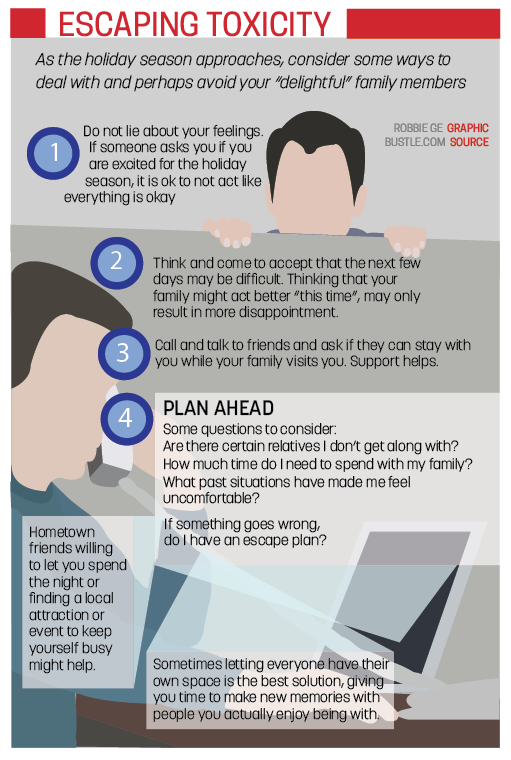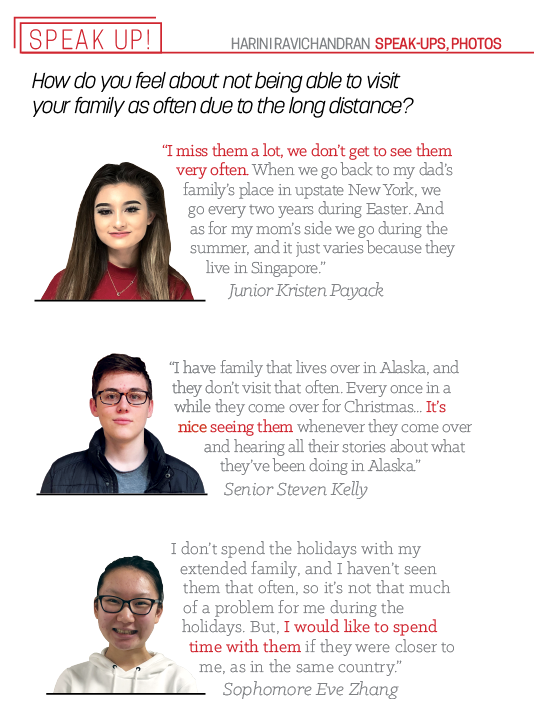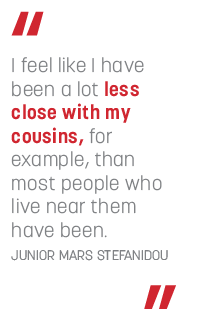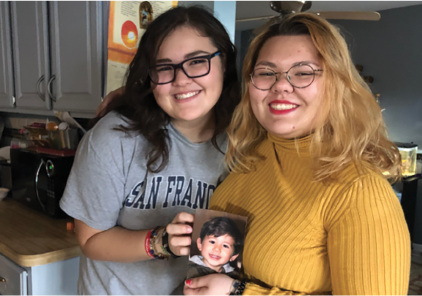This winter break, junior Maria “Mars” Stefanidou will be visiting her relatives for the holidays. However, for Stefanidou, it won’t be the run-of-the-mill driving to grandma’s house type of visit—instead, she’ll be flying all the way to Greece.
“We’re going to be going (to Greece and Belgium), which I’m really excited about because we never do anything that interesting over winter break,” Stefanidou said.
As Stefanidou mentioned, being able to visit extended family can be a difficult process, as Marcia Spaid, coordinator of the Japanese Exchange Program, can attest to. She said that she won’t be able to visit her son and grandchildren living in Japan this winter break, as it can be difficult coordinating such a major trip over such a short time period, especially when she still has family in Indiana.
“Winter months are hard because you never know about the weather here or there. If I went to Japan over Christmas then I would be missing Christmas with my grandkids who live here.”
For junior Yasmine Pehlivan, having extended family live in various places around the globe—from Germany to Turkey to New York—has impacted her relationships with her relatives as well.
“Our relationships aren’t that strong but at the same time they kind of are because then when I see them—I don’t know how to explain it. It’s like everything super extra,” Pehlivan said.
“I do feel sometimes like (my extended and nuclear family) have a disconnect because—I mean they are our family and we love them a lot. But we only really see them once a year,” Stefanidou said. “I feel like I have been a lot less close with my cousins, for example, than most people who live near them have been. We’ve had less like growing up together experiences because, I’ve lived basically my whole life in the states, but they were over there… But we try to make the best of it and see them as often as we can.”
In addition, Chinese teacher Tungfen Lee added that living in a completely different environment from extended family members has shaped the perspectives of her children to be more open to different views.
“Because of the time difference and distance, we can only communicate (with extended family) using a phone or FaceTime. But something is missing,” Lee said. “When I told my son, ‘I’m going to bring you back to Taiwan this summer,’ my son’s reaction is not happy at all… If they can see their grandparents every day they will be excited to go back to Taiwan, but since we only see in person only every two years or three years, they can only see each other on the screen, on the computer, on the cell phone—their relationship is not close at all.”
However, Stefanidou said she has found her Greek heritage to take a major part in shaping her life—and while she may not be constantly submerged in Greek culture in contrast to her extended relatives, she still feels the impacts.
“You feel a really different sense of community when you’re from a different culture because whenever I hear about another Greek person in the news or whenever I meet another person who’s Greek, you just feel this sudden sense of community because you’re able to relate to them in a way that not many other people are able to relate to them,”  Stefanidou said.
Stefanidou said.
Spaid agreed as well, saying that experiencing different cultures is a large reason as to why she has extended family living in Japan in the first place.
“If it wasn’t for the Japanese Exchange Program I don’t think my son would be living in Japan. He first went there because of the program and fell in love with the country and culture. Having been there 10 times with the program, I have made many friends and have people there that are truly my family besides my son. I have a deep respect for Japan and the people there,” Spaid said. In the end, while having family members scattered across so many countries and cultures may make it difficult to visit often, Stefanidou said the combination of cultures simply creates a very unique experience that she enjoys.
“I feel like it’s a different experience,” Stefanidou said. “It’s not a hugely different one… but in my personal life and especially when I was younger, I feel like it definitely impacts your development and not in a bad way or in a good way. It’s just a different way.”


































![British royalty are American celebrities [opinion]](https://hilite.org/wp-content/uploads/2024/03/Screenshot-2024-03-24-1.44.57-PM.png)


















![Review: “Suits” is a perfect blend of legal drama and humor [MUSE]](https://hilite.org/wp-content/uploads/2024/04/unnamed-1.png)
![Chelsea Meng on her instagram-run bracelet shop [Biz Buzz]](https://hilite.org/wp-content/uploads/2024/04/IMG_2446-1200x838.jpg)
![Review: Quiet on Set: The Dark Side of Kids TV is the long awaited exposé of pedophilia within the children’s entertainment industry [MUSE]](https://hilite.org/wp-content/uploads/2024/04/unnamed.jpg)
![Review: “The Iron Claw” cannot get enough praise [MUSE]](https://hilite.org/wp-content/uploads/2024/04/unnamed.png)
![Review: “The Bear” sets an unbelievably high bar for future comedy shows [MUSE]](https://hilite.org/wp-content/uploads/2024/03/unnamed.png)
![Review in Print: Maripaz Villar brings a delightfully unique style to the world of WEBTOON [MUSE]](https://hilite.org/wp-content/uploads/2023/12/maripazcover-1200x960.jpg)
![Review: “The Sword of Kaigen” is a masterpiece [MUSE]](https://hilite.org/wp-content/uploads/2023/11/Screenshot-2023-11-26-201051.png)
![Review: Gateron Oil Kings, great linear switches, okay price [MUSE]](https://hilite.org/wp-content/uploads/2023/11/Screenshot-2023-11-26-200553.png)
![Review: “A Haunting in Venice” is a significant improvement from other Agatha Christie adaptations [MUSE]](https://hilite.org/wp-content/uploads/2023/11/e7ee2938a6d422669771bce6d8088521.jpg)
![Review: A Thanksgiving story from elementary school, still just as interesting [MUSE]](https://hilite.org/wp-content/uploads/2023/11/Screenshot-2023-11-26-195514-987x1200.png)
![Review: When I Fly Towards You, cute, uplifting youth drama [MUSE]](https://hilite.org/wp-content/uploads/2023/09/When-I-Fly-Towards-You-Chinese-drama.png)
![Postcards from Muse: Hawaii Travel Diary [MUSE]](https://hilite.org/wp-content/uploads/2023/09/My-project-1-1200x1200.jpg)
![Review: Ladybug & Cat Noir: The Movie, departure from original show [MUSE]](https://hilite.org/wp-content/uploads/2023/09/Ladybug__Cat_Noir_-_The_Movie_poster.jpg)
![Review in Print: Hidden Love is the cute, uplifting drama everyone needs [MUSE]](https://hilite.org/wp-content/uploads/2023/09/hiddenlovecover-e1693597208225-1030x1200.png)
![Review in Print: Heartstopper is the heartwarming queer romance we all need [MUSE]](https://hilite.org/wp-content/uploads/2023/08/museheartstoppercover-1200x654.png)






















![Review: Ladybug & Cat Noir: The Movie, departure from original show [MUSE]](https://hilite.org/wp-content/uploads/2023/09/Ladybug__Cat_Noir_-_The_Movie_poster-221x300.jpg)

![Review: Next in Fashion season two survives changes, becomes a valuable pop culture artifact [MUSE]](https://hilite.org/wp-content/uploads/2023/03/Screen-Shot-2023-03-09-at-11.05.05-AM-300x214.png)
![Review: Is The Stormlight Archive worth it? [MUSE]](https://hilite.org/wp-content/uploads/2023/10/unnamed-1-184x300.png)


